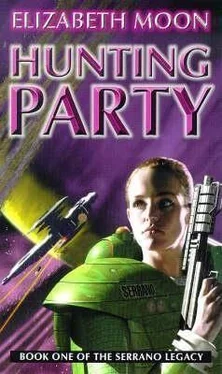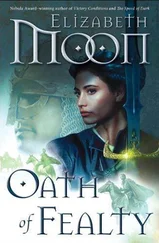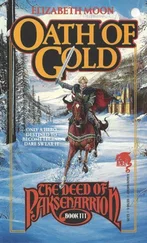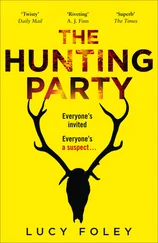“No,” he said soberly. “You couldn’t. I’m sorry I misunderstood what you’d done.”
“How many—how many died?” Heris asked. Cecelia could hear the fragile control, the tremor in her voice.
“Too many,” Petris said. “But it’s over now.”
“It’s not over,” Heris said. “It will never be over.” But she stood straight, motionless, and Cecelia watched her usual control return, layer by layer.
“Well, it’s mostly over,” said a cheerful voice from the cave entrance. Petris and the other men whirled, startled, but relaxed when they saw the distinctive uniform of Bunny’s militia. The militia captain was grinning at them. “Unless one of you is the wicked Admiral Lepescu?”
“Admiral Lepescu is dead,” Heris said. Her voice seemed to hold no emotion at all; it was the simple statement of fact.
Captain Sigind came nearer, glanced at Lepescu’s body, and nodded. “You shot him?”
“Yes; he was threatening them—” Heris nodded at the young people. Ronnie and the prince had untangled themselves from each other, the floor, and the quiescent grenade, and now stood more or less at attention. Raffa had gone to Ronnie, Cecelia noticed, as if he were her responsibility. Bubbles stood a little apart from the group, rifle in hand, watching Heris intently. Cecelia had time to wonder why, when both girls were armed, neither had shot the admiral.
Captain Sigind looked them over.
“And here’s Lord Thornbuckle’s daughter, and I presume that’s your nephew, ma’am, and the other young lady, and who’s this—?” The militia captain looked at the prince, and the prince looked confused.
“Mr. Smith,” said Ronnie firmly. “A friend of the family.”
Captain Sigind allowed a dubious expression on his face, and then shrugged it away. “Mr. Smith, indeed. An invited guest? Pardon, but I’m required to ask.”
Bubbles spoke up. “Mr. Smith has often been an invited guest here; my father will confirm it.”
“I . . . see.” The captain looked as if he would like to pursue that, but again chose discretion. Well trained, Cecelia thought; a quick glance at Heris’s face, and she caught another well-trained expression. Heris, however, would certainly pursue the matter later. The captain did not quite shrug before going on. “Well, if everyone will come along, we can get you back to Bandon this evening, and fly you back to the Main House by morning—or you could spend the night on Bandon, and fly back tomorrow, whichever you prefer.” He spoke into his comunit; Cecelia heard something about “retrieve the bodies” and “forensics” and then realized she was very, very tired indeed and wanted to sit down.
“What about George?” she heard Ronnie ask. Then she heard nothing.
Cecelia awoke only moments later, thoroughly ashamed of herself, to find Ronnie kneeling beside her. He looked, she thought, far worse than she possibly could, with that colorful pattern of bruises on his head and face, his muddy, still-wet clothes, and the pallor of exhaustion and hunger. She glanced around for Heris. Her captain was talking to the militia captain, who nodded as he keyed information into a wristcomp. Other militia had appeared; Lepescu’s body had already been put into a black bag and lifted onto a stretcher. . . . She saw it being carried out.
“Are you all right, Aunt Cecelia?” He sounded genuinely concerned, not annoyed by an aunt who had fainted.
“I’m fine,” she said, and pushed herself up on her elbows. She was too old to faint; at her age people took it seriously and talked about medical causes. “Just hungry,” she said, which was now true. She was ravenous, and remembered that she had not had breakfast or lunch. Ronnie looked around frantically, as if he thought she expected him to pull a good meal from the rock. “Don’t worry,” she said, more tartly than she intended. “I forgot to eat, that’s all.” When she glanced around again, she saw that the two young women were sitting together, doing something to each other’s faces, and the other young man stood awkwardly alone. “What’s the—”
“Mr. Smith,” Ronnie said softly but firmly. “He’s Mr. Smith—I don’t know if you’ve met.”
“Oh, we’ve met.” She eyed him, then glanced at the prince. “Mr. Smith, is it? Did you two arrange to meet here and continue your disagreement?”
“No!” Ronnie hushed himself with a shrug. “He was here on . . . other business. Finished business, now.”
Cecelia looked at the prince, who seemed to feel her gaze and returned it. In the cave’s uncertain light, she could not be sure of his expression, but he approached them.
“Excuse me,” he said. “Ronnie, I really do need to talk to you. About the duel—”
“Mr. Smith,” said Cecelia, in the voice that had not failed her in fifty years or more. “You do not need to talk to anyone. Under the circumstances, Mr. Smith”—she emphasized the name slightly—“the less you talk to anyone the better. I very much doubt your father knows where you are.”
“Well, no, he doesn’t, but still—”
“You would be wise, Mr. Smith, to wait until your father explains your situation more fully. There is no question of a duel. Is that quite clear?” Cecelia put her eye upon him, the eye that had quelled many a brash young man even when she herself was young. He subsided; even the stubborn knot along his jaw went away, and the jaunty curl at the tips of his moustache seemed to droop. His voice lowered to a hesitant growl.
“What I was going to say, ma’am, was that your nephew’s courage in landing on the gas grenade cancelled out any previous disagreement we might have had.”
“You did, too,” Ronnie said quickly.
“Wise of both of you,” Cecelia said, allowing them to see her smile. “Now if someone can find me something to eat—”
Cecelia had never thought about how long it could take to move a few people across a short stretch of ocean. She had always been, she realized, the one who didn’t have to wait. This time, she waited, and heard from both militia and the young people what had happened. Even with her wits restored by hot broth and half a survival bar from Bubbles’s pack, it didn’t make sense to her.
“Lepescu killed the other hunters? Why?”
Heris rubbed her nose. “My guess would be that he thought he could get away alone. No witnesses on his side, convicted criminals—if any survived—on the other. . . . If he’d killed the young people, gotten into that flitter, and made it away—”
“But he couldn’t possibly—”
“I’m not sure. Suppose we had still been on the mainland when George’s transmission went out. He’d have had hours, not minutes, to complete his plans. Kill the witnesses, gas the remaining victims from the flitter. Fly back to Bandon, take the shuttle up. A wild gamble, but he liked wild gambles. Better than surrendering tamely to be tried himself.”
“But why not get the others to help him?”
“Likely they wouldn’t. That Mr. Smith—and by the way, are you and the others going to tell me who Mr. Smith is?”
“Someone who shouldn’t be here,” Cecelia said. “Later, perhaps—” She glanced around at the militia who might be within earshot.
“Ah. Like someone’s son, perhaps? Yes.” Heris’s eyes twinkled. “Anyway, Mr. Smith explained that there had been a lot of confusion after the flitter crashed here, and the admiral had insisted on continuing the hunt. He might well fear that his allies would turn on him. If he had gotten away—well away—we would have found an island full of dead people and no witnesses to convict him. He would not necessarily know that I was here at all, or that I knew he was onplanet.” Heris cocked her head. “A bold plan, typical of him, but as usual wasteful of resources.”
Читать дальше












